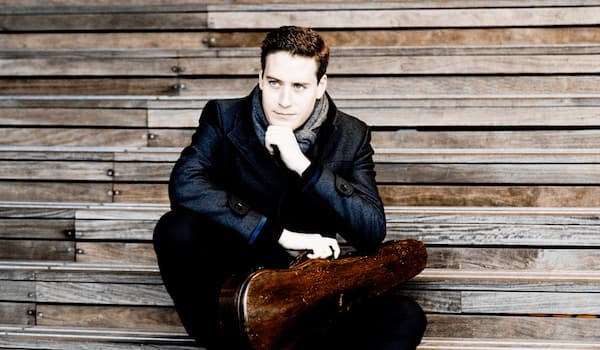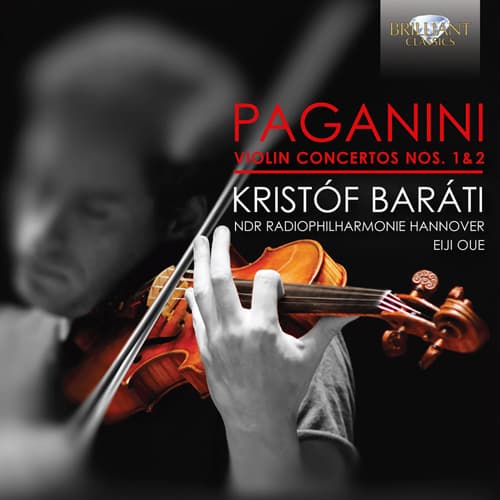Kristóf Baráti, born on 17 May 1979 in Budapest, Hungary, is an internationally acclaimed Hungarian violinist whose virtuosic command and interpretive depth have positioned him among the foremost musicians of his generation. Born into a musical family, Baráti spent his formative years in Hungary and Venezuela, eventually pursuing advanced studies with Vilmos Tátrai and Eduárd Wieniawski in Budapest.

Kristóf Baráti
Baráti came to international prominence by placing third in the 1997 Queen Elisabeth International Violin Competition. He has since performed with leading ensembles and conductors. His contributions are marked by technical precision and profound musical insight, cementing his status as a leading violinist of the 21st century.
On the occasion of his birthday on 17 May, let us sample some of his most iconic recordings and performances.
Kristóf Baráti Performs Bartók’s Violin Concerto No. 2 (excerpt)
Bach Partitas

Kristóf Baráti’s 2010 recording of Johann Sebastian Bach’s Six Sonatas and Partitas for Solo Violin, is widely regarded as a landmark in his discography and a defining contribution to the modern canon of Bach interpretations. Performed on the 1703 “Lady Harmsworth” Stradivarius, the recording is celebrated for its clarity, emotional intensity, and scholarly fidelity.
Baráti’s engagement with Bach started early in his career, and his interpretation is distinguished by its synthesis of technical precision, structural clarity, and emotional immediacy. Emphasising Bach’s timelessness over dogmatic performance practices, his approach reflects a deep understanding of Bach’s polyphonic writing. Implied voices within a single melodic line are articulated with remarkable transparency, and critics have noted his ability to “maintain a conversational quality.”
J.S. Bach: Violin Partita No. 2 in D minor, BWV 1004 (Kristóf Baráti, violin)
Beethoven Violin Sonatas

Kristóf Baráti is well known for his commitment to chamber music. He has frequently collaborated with pianist Klára Würtz, a Dutch-Hungarian musician with a strong chamber music background. Their recording of the complete Beethoven Violin Sonatas has been praised for its intimate and chamber-like approach, “prioritising lyrical warmth over theatrical grandeur.”
The Beethoven Project is a compelling blend of technical precision, expressive lyricism, and collaborative synergy, tailored to Beethoven’s diverse stylistic demands. Baráti’s technique is impeccable, featuring precise intonation and agile bow work. His Hungarian musical heritage infuses his playing with a slight rhythmic freedom and fiery energy, particularly evident in the dance-like movements. For critics, the recording is significant for its technical assurance, which makes the sonatas “accessible yet profound.”
Ludwig van Beethoven: Violin Sonata No. 5 in F Major, Op. 24 “Spring” (Kristóf Baráti, violin; Klára Würtz, piano)
Paganini Concertos

The Brilliant Classics recording of Paganini’s Violin Concertos Nos. 1 and 2 with the Hungarian Radio Symphony Orchestra was recorded early in Baráti’s international career. This recording reflects his rise as a virtuoso, yet it also balances showmanship with musicality.
Baráti’s approach is tailored to the work’s virtuosic and operatic nature, and he effortlessly navigates the fiendish passages with remarkable ease. His phrasing reflects singing, vocal-like melodies in the slow movements, providing emotional balance to the virtuosic fireworks elsewhere. His performance has been described as “charismatic,” and his playing as “dazzling yet precise.”
Niccolò Paganini: Violin Concerto No. 2 in B minor, Op. 7 (Kristóf Baráti, violin; Hannover Radio Philharmonic Orchestra; Eiji Oue, cond.)
Brahms Trio
Kristóf Baráti’s approach to Johannes Brahms‘s music is characterised by a compelling blend of lyrical warmth, technical precision, emotional depth, and collaborative sensitivity, tailored to Brahms’ blend of Romantic expressiveness and classical structure. Unlike the Paganini recordings, Baráti’s Brahms prioritises ensemble balance, ensuring the violin complements rather than overshadows the piano or other instruments.
Baráti’s “playful yet controlled” pulse brings energy to Brahms’ rhythmic motifs, while his “heartfelt expressiveness” captures the composer’s emotional complexity. Baráti excels at Brahms’ sudden shifts of mood, where his “vivid narrative” creates a compelling arc. A seamless dialogue between all performers ensures equal partnership and “cohesive dynamics.”
Kristóf Baráti is a masterful violinist who captivates audiences across solo, chamber, and orchestral repertoire. His Hungarian heritage infuses his interpretations with a unique rhapsodic flair, while his collaborative sensitivity ensures cohesive ensemble work. Critics consistently laud his “singing tone” and “heartfelt expressiveness,” cementing his reputation as a leading interpreter of classical music.
For more of the best in classical music, sign up for our E-Newsletter
